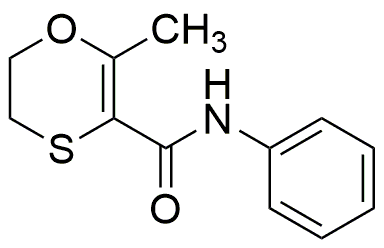Carboxin is widely utilized in research focused on:
- Agricultural Fungicide: It is primarily used as a seed treatment to protect crops from fungal diseases, enhancing seed germination and plant health.
- Plant Protection: Carboxin helps in controlling soil-borne pathogens, making it invaluable in the cultivation of crops like wheat and barley, thereby increasing yield and quality.
- Research in Plant Pathology: Researchers use it to study the effects of fungal infections on plants, providing insights into disease resistance and management strategies.
- Development of New Formulations: The compound is used in the development of advanced fungicide formulations, improving efficacy and reducing environmental impact compared to older chemicals.
- Integrated Pest Management (IPM): Carboxin plays a role in IPM strategies, allowing farmers to combine chemical and biological controls for sustainable agriculture.
Informations générales
Propriétés
Sécurité et réglementation
Applications
Carboxin is widely utilized in research focused on:
- Agricultural Fungicide: It is primarily used as a seed treatment to protect crops from fungal diseases, enhancing seed germination and plant health.
- Plant Protection: Carboxin helps in controlling soil-borne pathogens, making it invaluable in the cultivation of crops like wheat and barley, thereby increasing yield and quality.
- Research in Plant Pathology: Researchers use it to study the effects of fungal infections on plants, providing insights into disease resistance and management strategies.
- Development of New Formulations: The compound is used in the development of advanced fungicide formulations, improving efficacy and reducing environmental impact compared to older chemicals.
- Integrated Pest Management (IPM): Carboxin plays a role in IPM strategies, allowing farmers to combine chemical and biological controls for sustainable agriculture.
Documents
Fiches de données de sécurité (FDS)
La FDS fournit des informations de sécurité complètes sur la manipulation, le stockage et l’élimination du produit.
Spécifications du produit (PS)
Le PS fournit une description complète des propriétés du produit, notamment sa composition chimique, son état physique, sa pureté et les exigences de stockage. Il détaille également les plages de qualité acceptables et les applications prévues du produit.
Certificats d'analyse (COA)
Recherchez des certificats d'analyse (COA) en saisissant le numéro de lot du produit. Les numéros de lot et de lot se trouvent sur l'étiquette d'un produit, après les mots « Lot » ou « Lot de fabrication ».
Numéro de catalogue
Numéro de lot/série
Certificats d'origine (COO)
Ce certificat d'exploitation confirme le pays dans lequel le produit a été fabriqué, et détaille également les matériaux et composants utilisés et s'il est issu de sources naturelles, synthétiques ou autres sources spécifiques. Ce certificat peut être requis pour les douanes, le commerce et la conformité réglementaire.
Numéro de catalogue
Numéro de lot/série
Fiches de données de sécurité (FDS)
La FDS fournit des informations de sécurité complètes sur la manipulation, le stockage et l’élimination du produit.
DownloadSpécifications du produit (PS)
Le PS fournit une description complète des propriétés du produit, notamment sa composition chimique, son état physique, sa pureté et les exigences de stockage. Il détaille également les plages de qualité acceptables et les applications prévues du produit.
DownloadCertificats d'analyse (COA)
Recherchez des certificats d'analyse (COA) en saisissant le numéro de lot du produit. Les numéros de lot et de lot se trouvent sur l'étiquette d'un produit, après les mots « Lot » ou « Lot de fabrication ».
Numéro de catalogue
Numéro de lot/série
Certificats d'origine (COO)
Ce certificat d'exploitation confirme le pays dans lequel le produit a été fabriqué, et détaille également les matériaux et composants utilisés et s'il est issu de sources naturelles, synthétiques ou autres sources spécifiques. Ce certificat peut être requis pour les douanes, le commerce et la conformité réglementaire.


